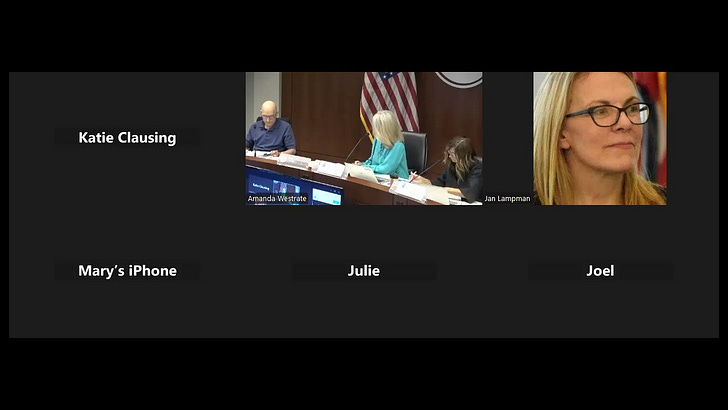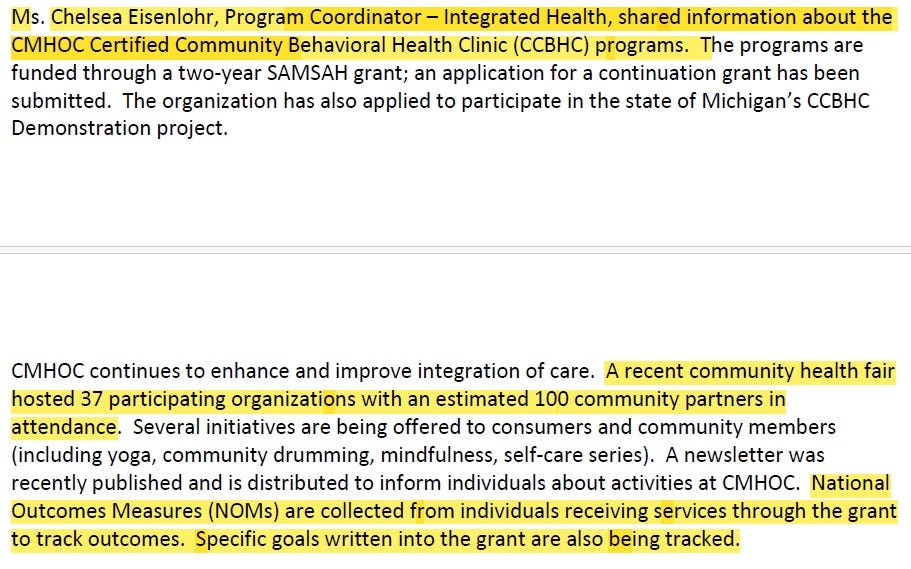During the executive director's report at the June 28, 2024, Community Mental Health Ottawa County (CMHOC) meeting, Interim Executive Director Dr. Michael Brashears highlighted concerns with the newly released state mental health care budget. Although the state budget includes significant funding for behavioral health, there are no significant increases for supporting mental health. Therefore, the way the money is allocated does not appear to match the needs of the community.
Referring to the budget, Dr. Brashears stated, (16:27) “If you hear about that in the headlines, the governor’s budget, it’s heavy on mental health; it actually is heavy on mental health from one section, and very light, and I’m shocked, very light on the traditional funding. There are no major increases for our main Medicaid budget that we have with the state that supports all of our services for developmental disabilities and for mentally ill outside of the CCBHC [Certified Community Behavioral Health Clinic] arrangement.”
To understand what Dr. Brashears is saying it is helpful to have some background information on the CCBHC. A CCBHC is not a clinic, but a networked system of care that addresses behavioral health. CCBHC does not focus on traditional treatment methods such as counseling, and does not cover services for intellectually and developmentally (IDD) impaired individuals, but rather focuses on addressing behaviors and characteristics that have been linked with high rates of mental illness (MI) and substance use disorder (SUD) such as obesity, poverty, and smoking. The intent is to reduce rates of MI and SUD, thereby reducing costs, by addressing behavior. Additionally, CCBHCs place a significant emphasis on crisis care. Several CCBHC services appear to fall outside of the mission/vision of CMH, so there is concern regarding the CMH’s obligations should they become an approved CCBHC entity, and there is significant concern that implementing the CCBHC system will result in a loss of choice for consumers.
The Substance Abuse Mental Health Services Administration (SAMHSA) as well as several state governments have provided grant funding to select organizations for the purpose of creating the necessary data collection and partnership organization infrastructure to establish a CCBHC. An approved CCBHC operates along-side, or over an existing CMH system. Unsurprisingly, Ottawa County CMH received several CCBHC grants.
(Image of May 2023 meeting minutes)
Dr. Brashears plans to further investigate the impact the governor’s budget will have on current CMH services as well as the impact of continuing to build the Ottawa County CCBHC. He stated, (15:40) “Yesterday, the state of Michigan passed their budget, and there’s a couple of key elements that over the next several weeks, I’m going to be examining, and then presenting to the board the possible impact to the community mental health budgets.” He continued, (15:52) “The state is approving another $161 million for CCBHC’s. [] I need to understand the impact to our existing program, and what this funding does.”
Dr. Brashears stated that there was no significant increase to traditional Medicaid funding which is used to cover the majority of CMH services. (19:00) “$25 million for the entire state [] $7.2 million to ensure that people have access to Michigan crisis lines.” “I want to make sure the money is spent not only in identifying who’s in crisis, but what you do with them after the crisis. We have so many mechanisms to identify who needs care; how about funding to actually provide it.”
“There was nothing in the governor’s budget that significantly addressed true mental health needs within the system, aside from these items here; and it was quite shocking.”
It appears the greatest CMH need lies in providing services associated with Medicaid as Ottawa County is having difficulty meeting the demand with the funding provided by the state. In fact, community mental health Ottawa County has been struggling with this for a number of years. In 2016, CMHOC turned to the community asking for help, and the community responded by passing the mental health millage. Unfortunately, neither CCBHC funding nor mental health millage funding can be used to fund services covered by Medicaid. While the community believed they were helping to support mental health care by passing the millage, it appears the bulk of the money from the mental health millage was used to fund behavioral services that correspond to the requirements for establishing an approved CCBHC.
Interim Executive Director Brashears was the CMH Executive Director approximately 11 years ago, and has applied for the permanent position. He acknowledged that the CCBHC system is confusing and noted he will be giving formal presentations in July/August to the board and public to provide clarity. I'm very excited that Dr. Brashears is working to understand the implications of creating a CCBHC and has a desire for transparency and effective mental health care. Hopefully he gets the full-time job.



